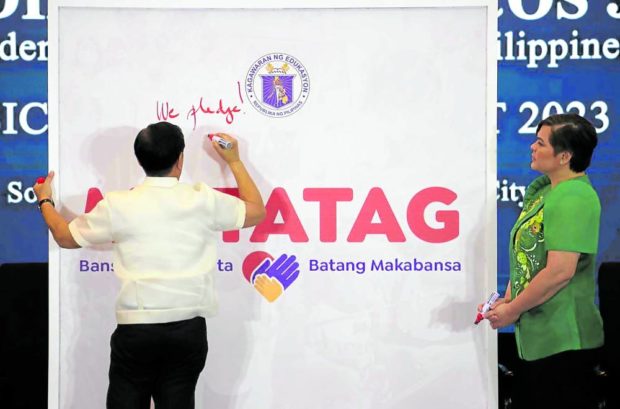
COMMITMENT | President Ferdinand Marcos Jr. signs the commitment wall for “Matatag: Bansang Makabata, Bansang Makabansa,” the government agenda in solving problems plaguing Philippine education, during the presentation of the Basic Education Report 2023 by Vice President and Education Secretary Sara Duterte (right) on Monday, Jan. 30, 2023. (Photo by NIÑO JESUS ORBETA / Philippine Daily Inquirer)
MANILA, Philippines — Reporting on the state of education in the country, Vice President and concurrent Education Secretary Sara Duterte said on Monday that the education system had “failed” and “burdened” teachers.
This was based on the Department of Education’s (DepEd) assessment of the K-12 curriculum which showed “insufficient knowledge [among teachers] on developing 21st-century skills, including higher-order thinking skills among learners,” Duterte said in her Basic Education Report 2023.
She clarified, however, that this was not the fault of the teachers — the DepEd’s lifeblood — whom she praised for their dedication, integrity, and commitment to service.
“The sad reality is that the system has failed them,” she said, adding: “This is a system that burdens them with backbreaking and time-consuming administrative tasks, a system that provides no adequate support and robs them of the opportunity to professionally grow and professionally teach, assist, and guide our learners.”
As she laid down her education agenda, Duterte stressed that teachers would be provided with support that includes professional development programs, removal of nonteaching tasks, and fast-tracking of the implementation of the career progression policy.
Without going into details, she said she would continuously push for additional benefits under the Magna Carta for Public School Teachers, specifically the implementation of the policy on the distribution of teacher workload and payment of teaching overload.
Duterte added that DepEd would work on addressing issues that affect the net take-home pay of educators and talk to the Department of Health about providing them with free annual medical examinations.
Better benefits package
“We are also closely coordinating with the [Government Service Insurance System] for an improved and superior benefits package for all DepEd personnel. We will resolve issues on teachers’ loans, premium remittances, and other benefits,” she said, promising teachers that “we will not leave you behind.”
President Ferdinand Marcos Jr., who was also present, expressed support for teachers and reaffirmed his commitment to invest in the educational sector to make it at par with that of other countries.
He also promised to build infrastructure that would provide the academic sector with a healthy and safe environment conducive to learning.
“Teachers do not become teachers because they want to become rich. Teachers become teachers because they have to. It is a vocation,” Marcos said.
“And it is up to us to support them in that effort because they feel the need to educate young people. And we are blessed that we have such teachers and we should hold them close and do all we can to support them so that they can do, to the best of their ability, what they have pledged to do,” he added.
The president challenged all stakeholders to become “active key players” in building the country’s “best education system” yet.
“We owe it to our children to prioritize their well-being and give them the highest possible quality of education so they may become the innovators and the leaders of tomorrow not only of the Philippines but of the world,” he said.
Most pressing issue
According to Duterte, the lack of school infrastructure and resources to support the ideal teaching process was the most pressing issue facing basic education.
Based on the DepEd’s latest inventory, out of the 327,851 school buildings nationwide, only 104,536 were in good condition.
“Due to various reasons, there are also 100,072 school buildings that need minor repairs; 89,252 require major repairs, and 21,727 are set for condemnation,” she said. This year’s budget of P15.6 billion for the construction of school buildings, however, can fund only 6,000 classrooms.
Duterte said DepEd was planning to establish fully functional library hubs in division offices and provide electricity in its “last-mile schools,” on top of providing “e-classroom packages” for teaching and learning, consisting of 46 laptops, two charging carts, two wireless routers, and a smart TV.
“This will accelerate the integration of [information and communications technology] in teaching and learning and institutionalize blended learning,” she added.
In terms of the learning situation, Duterte underscored the problem of literacy as shown in the 2018 results of the Programme for International Students Assessment or Pisa, which she said was “distressing as it is alarming for me as a mother and as [education secretary].”
Based on the international assessment, 81 percent of participating Filipino students could not solve math problems, 81 percent had trouble understanding moderate-length texts, and 78 percent could not determine the correct explanations for scientific phenomena.
To improve the quality of education, the DepEd intended to revise the “congested” K-12 curriculum and reduce the number of learning areas so students could focus on developing foundational skills in literacy and numeracy.
Duterte said the department also wanted to “improve English proficiency while recognizing linguistic diversity.”
“We will work toward the goal of English language proficiency within the context of a multilingual nation,” she said, adding that there would be a review of the implementation of the mother tongue-based multilingual education policy.
Duterte also promised transparency regarding the curriculum guides being used, as well as the test scores of students so researchers and analysts could apply these in drafting evidence-based policy decisions.
“To make our graduates employable, we appeal to the industry, and to employers, to accept our students in work immersions, and hire them when they graduate,” she said.
In improving the learning environment for learners, Duterte said DepEd would implement child protection policies and make students feel safe and respected and “make them, including our indigenous peoples’ learners and those with disabilities, feel that they belong.”